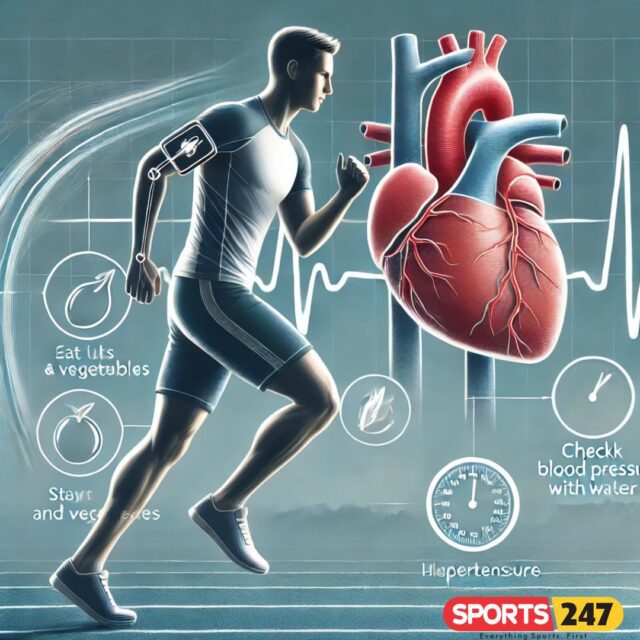Hypertension, commonly known as high blood pressure, is often considered an issue for older adults or inactive individuals.
However, athletes and sportspeople, despite their physical fitness, can also develop this condition.
In fact, athletes may face unique risks due to their intense training regimens and stress. Understanding the causes, prevention, and management of hypertension is crucial for maintaining peak performance and long-term health.
What is Hypertension?
Hypertension occurs when the force of blood pushing against the walls of your arteries is consistently too high. A normal blood pressure reading is generally around 120/80 mmHg. When it rises above 140/90 mmHg, it is considered high. If left unmanaged, hypertension can damage vital organs like the heart, brain, and kidneys.
Causes of Hypertension in Athletes:
1. Genetics:
Family history can make some athletes more prone to developing hypertension, regardless of their fitness level.
2. Stress:
The pressure to perform at high levels, constant competition, and intense training schedules can increase stress hormones like cortisol, raising blood pressure.
3. Dietary Habits:
Athletes often consume high-energy foods, some of which can be high in salt (sodium). Excessive sodium intake leads to water retention, which increases blood pressure.
4. Dehydration:
Dehydration can cause the blood vessels to constrict, which may lead to higher blood pressure during training or competition.
5. Use of Performance Enhancing Substances:
Some athletes use supplements, caffeine, or anabolic steroids that can raise blood pressure. Stimulants like energy drinks can also contribute to hypertension.
6. Overtraining:
Pushing the body beyond its limits without adequate rest can lead to chronic fatigue, increased heart rate, and high blood pressure.
Prevention of Hypertension in Athletes:
1. Regular Blood Pressure Monitoring:
Athletes should check their blood pressure regularly, especially if they have a family history of hypertension. Monitoring helps detect early signs of high blood pressure.
2. Balanced Diet:
Reduce Sodium: Limit the intake of processed and salty foods like chips, canned soups, and fast food. Opt for fresh fruits, vegetables, lean proteins, and whole grains.
Increase Potassium: Foods like bananas, spinach, and sweet potatoes are rich in potassium, which helps balance sodium levels and reduce blood pressure.
Hydration: Drink plenty of water throughout the day, especially during and after workouts to maintain proper fluid balance.
3. Manage Stress:
Mental Health: Incorporate relaxation techniques like deep breathing, meditation, or yoga to help manage the mental pressures of competition.
Sleep: Prioritize 7-9 hours of quality sleep every night, which allows the body to recover from training and maintain normal blood pressure levels.
4. Avoid Stimulants:
Be cautious with caffeine, energy drinks, and pre-workout supplements that contain stimulants. These can raise heart rate and blood pressure temporarily and, with consistent use, cause long-term problems.
5. Rest and Recovery:
Schedule rest days in your training routine to allow your cardiovascular system to recover. Overtraining can put unnecessary strain on your heart.
Management and Treatment of Hypertension in Athletes:
If diagnosed with hypertension, the key to treatment is controlling blood pressure through lifestyle changes and, in some cases, medication.
1. Lifestyle Changes:
Exercise: Continue regular physical activity, but balance high-intensity workouts with low-impact exercises like swimming, walking, or yoga to avoid over-stressing the cardiovascular system.
Weight Management: Maintain a healthy weight. Even in athletes, excess body fat can contribute to higher blood pressure.
Limit Alcohol: Excessive alcohol consumption can raise blood pressure, so it’s important to drink in moderation.
2. Medications (if needed):
If lifestyle changes are not enough to lower blood pressure, a doctor may prescribe medications such as:
Diuretics: Help reduce the amount of water and salt in your body.
Beta-blockers: Reduce the workload on the heart.
ACE inhibitors: Help relax blood vessels and reduce blood pressure.
Important: Athletes should work closely with their doctors to find medications that don’t negatively affect their performance or violate anti-doping regulations.
Cure and Long-Term Management:
While hypertension cannot always be “cured,” especially in cases where it’s hereditary, it can be effectively managed. By following the preventive measures, maintaining a healthy lifestyle, and using medication when necessary, athletes can control their blood pressure and continue to compete at high levels without the risks associated with high blood pressure.
Conclusion:
Hypertension is a serious health condition that can affect even the most physically active individuals. For athletes, managing blood pressure is crucial not only for long-term health but also for optimizing performance. By understanding the causes, preventing risky behaviors, and actively managing the condition through lifestyle adjustments and medical care, athletes can safeguard their heart health and continue to perform at their best.
For enquires/Consultation
Call- Dr kolade kolapo
+234-7032088130









